10 Moves That Can Help COPD

Exercise to Breathe Easier
With COPD, the less you do, the less you're able to do. Weak muscles need more oxygen, so you can become short of breath just shopping or cooking. Exercise changes that. When your muscles are stronger, daily activities are easier.
Swipe to advance
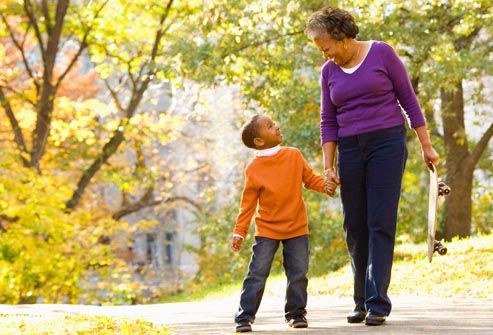
2
/
16
Walk
Just about everyone with COPD can exercise. Walking is a great choice, especially if you’re just getting started. Do it anywhere -- outside, in a mall, on a treadmill. If it seems daunting, add 30 seconds or 10 yards each day. Even a slow pace will do you good. If you haven't been active lately, check with your doctor before starting an exercise program.
Swipe to advance
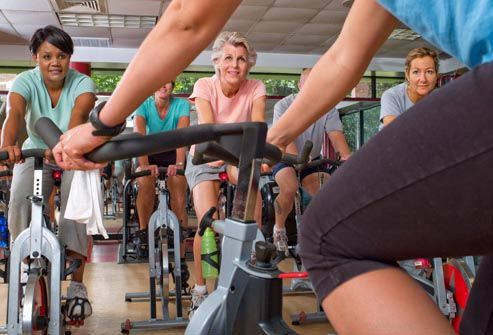
3
/
16
Bike
A stationary bike can work well for people with COPD. You can pedal away in the privacy of your home. In a gym or rehab setting, you can find supervision and meet people. Ask the instructor before jumping into a group cycling class, to be sure it matches your ability. As you improve, try a spin outside on a traditional bike and soak up the scenery. If any exercise makes you short of breath, stop and sit down for a few minutes.
Swipe to advance
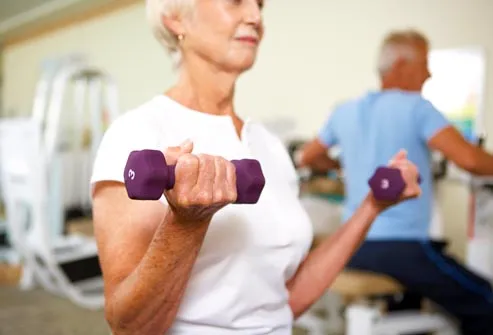
4
/
16
Arm Curls
Lifting light weights can help you reach a high shelf or lug a gallon of milk. Choose hand weights, stretchy bands, or water bottles to try arm curls. Hold the weights at your sides, palms forward. Breathe in. Now lift toward your chest, keeping elbows down, and exhaling slowly. Slowly lower your arms back down as you breathe in. Build up to two sets of 10-15 repetitions.
Swipe to advance
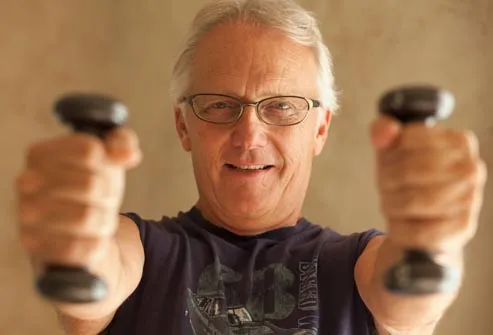
5
/
16
Forward Arm Raises
Hold weights down at your sides, palms facing in. Inhale, then exhale slowly as you raise both arms straight out front to shoulder height. Inhale as you slowly lower your arms. This strengthens your upper arms and shoulders. Build up to two sets of 10-15 repetitions. Start with light weights and go a little heavier every two to three weeks to challenge your muscles.
Swipe to advance
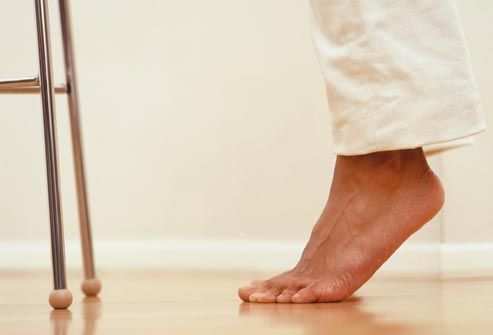
6
/
16
Calf Raises
Add leg work to your routine and you'll be able to walk easier and farther. For the calf raise, stand 6-12 inches behind a sturdy chair with your feet hip-width apart. Hold on for balance. Inhale. Now, lift up high on your toes, exhaling slowly. Hold the raised position briefly. Lower your heels back to the ground, inhaling slowly. As you get stronger, do one leg at a time. Work up to two sets of 10-15 reps.
Swipe to advance
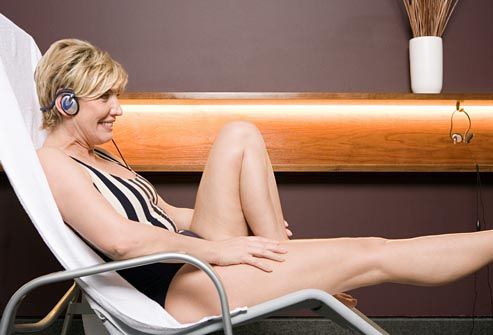
7
/
16
Leg Extensions
For stronger thighs, sit in a chair that supports your back. Inhale. Now exhale slowly as you stretch one leg as straight as you can, without locking your knee. Breathe in as you slowly lower your foot back to the floor. Do one set with your right leg, then one set with your left. Getting too easy? Add ankle weights. Work up to two sets of 10-15 reps.
Swipe to advance
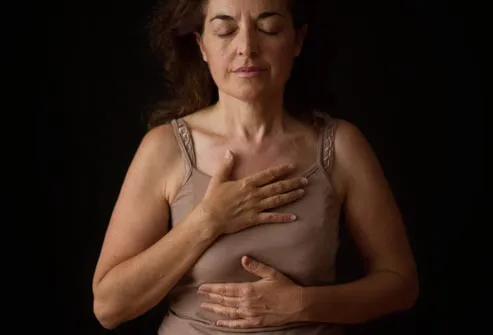
8
/
16
Exercise Your Diaphragm
This move strengthens a key breathing muscle, the diaphragm. Lie down with your knees bent or sit in an easy chair -- one hand on your chest, one below your rib cage. Slowly inhale through your nose so that your stomach raises one hand. Exhale with pursed lips and tighten your stomach. The hand on your chest should not move. Do this for 5 to 10 minutes, three or four times a day. Breathing this way will become easy and automatic.
Swipe to advance
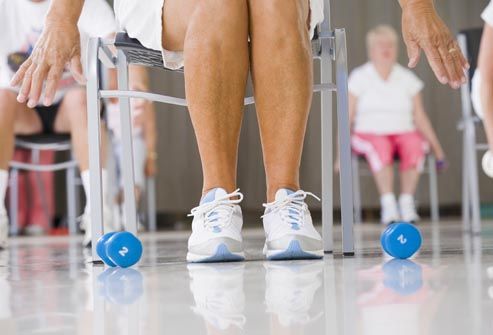
9
/
16
Chair Dance
If you love to dance, try this armchair version in a class or with a DVD at home. Different programs can get your heart pumping, or pump up your muscles, or both -- to all kinds of music, from big band to hip hop. Beginners might start with a class to learn the safest ways to swing and bend. Adding hand weights can increase the challenge -- and your fitness level.
Swipe to advance
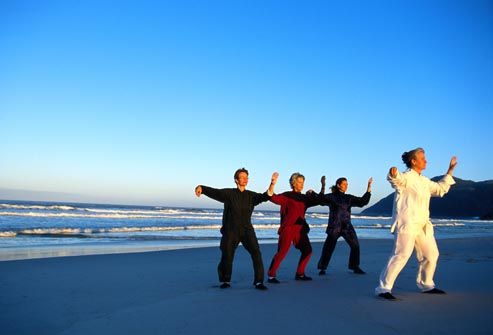
10
/
16
Do Tai Chi
Tai Chi -- an ancient Chinese practice of gentle, flowing movements -- is a winner for people with COPD. It's a mild workout for your heart and lungs and helps tone your muscles. It also eases stress and helps you relax, a special benefit if your COPD makes you anxious or edgy. Look for a class or video to learn the moves.
Swipe to advance
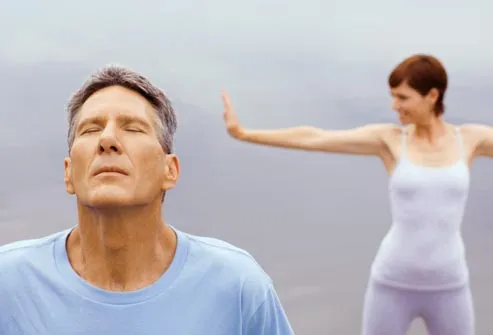
11
/
16
Breathe Right for Better Results
Breathe slowly during exercise. Inhale through your nose with your mouth closed. This warms and filters the air. Exhale through your mouth for twice as long as your inhale. Don't pant. That keeps your lungs from getting all the air out.
If your breath gets fast or shallow, stop and rest. Relax your body. Do pursed lip breathing: in through the nose and out slowly through pursed lips.
Swipe to advance

12
/
16
Schedule a Stretch
Stretch gently before and after a workout. One stretch to try: Put your hands flat on a wall at arm's length and shoulder height. Step forward and bend your right knee. Bend your left knee until you feel a slight stretch in your calf. It shouldn’t hurt. Hold for 10 to 30 seconds and repeat with left leg. Continue switching legs for three to five reps on each leg.
Swipe to advance
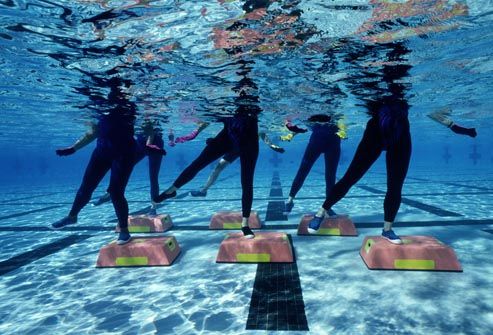
13
/
16
Try a New Way to Move
Jogging, skating, or rowing can be good exercises for people with mild COPD -- and fun ways to avoid workout boredom. Some activities do double duty, like water aerobics, which is good for COPD and arthritis. For beginners, a pulmonary rehab program is a good, safe place to start. Some people may need to avoid push-ups, sit-ups, or heavy lifting. Ask your doctor what's right for you.
Swipe to advance
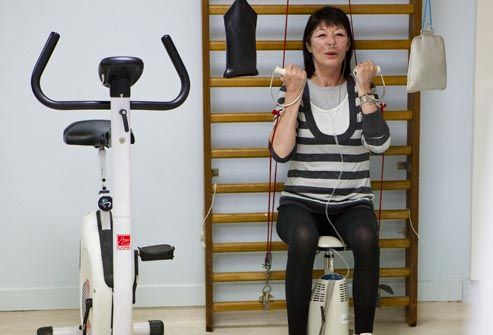
14
/
16
Exercising on Oxygen
If you use oxygen, you may worry that the equipment will be a hazard or a hassle. But if your doctor says to use oxygen during exercise, do it.
Extra long tubing can help at home. Small, light-weight "travel" tanks keep you mobile. You can do most exercises with oxygen.
Extra long tubing can help at home. Small, light-weight "travel" tanks keep you mobile. You can do most exercises with oxygen.
Swipe to advance
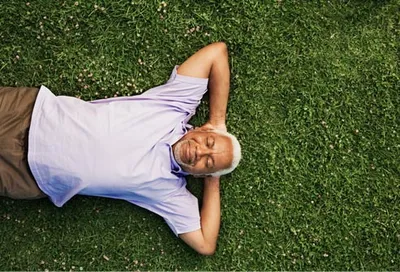
15
/
16
When Not to Exercise
Give yourself a day off if your COPD symptoms are acting up: you're wheezing, coughing up more fluids than usual, or are unusually short of breath. You may want to talk to your doctor. Call for help right away for shortness of breath that doesn't improve, fast or irregular heartbeat, and feeling dizzy or lightheaded.
Swipe to advance
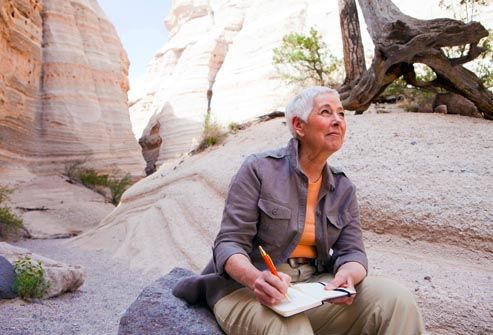
16
/
16
Make Exercise a Habit
The goal for most people is to exercise for 20 to 30 minutes, at least three times a week. Include cardio and strength training. If you're out of shape, start a level that's comfortable -- even if it's just one minute. Ways to stay motivated include:
- Find an exercise buddy.
- Plan exercise in your daily routine.
- Keep an exercise journal -- and make notes as you feel better in your daily activities.
Swipe to advance
- Get link
- X
- Other Apps